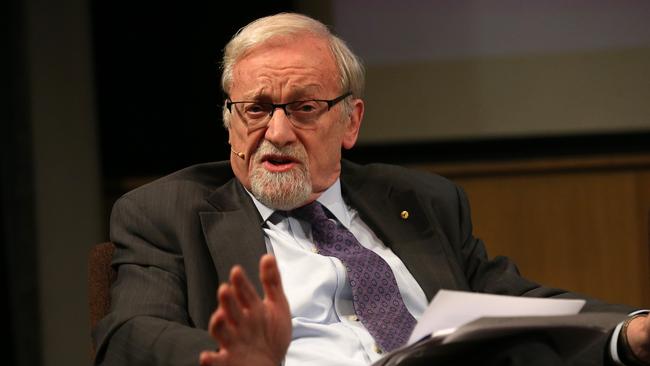Books battle: ex-foreign minister Gareth Evans sought MUP truce
Gareth Evans suggested an ‘obvious solution’ to the impasse between the University of Melbourne and its publishing house.

ANU chancellor Gareth Evans says he suggested an “obvious solution” to the impasse between the University of Melbourne and its brash publishing house, which it had funded to the tune of $26 million over the past 15 years.
The former Labor foreign minister saidhe had attempted to strike a truce between the university council and Melbourne University Publishing board members by suggesting a separate imprint for political memoirs, autobiographies and controversial journalistic exposes favoured under chief executive Louise Adler, who resigned this week.
“The tragedy is that this could so easily have been avoided,” said Professor Evans, whose own memoirs were published by MUP.
“A solution that I suggested to both sides over the last few months was to recognise the reality that the university publishing house needed to maintain its reputation and produce under its own imprint only high-quality academic or related publications.
“It makes a lot of sense to be able to cross-subsidise such publications with so-called trade books, much more down-market, appealing to a wider audience, profitable, but not obviously appropriate for a university press.
“My belief is that MUP should have been allowed to continue to publish such titles, but under a different imprint. It’s a pity cooler heads did not prevail.”
The university yesterday defended its decision to require MUP to focus on the publication of academic works by citing its contribution of $26m in subsidies to the publisher over 15 years.
The Australian also obtained a confidential memo sent by new vice-chancellor Duncan Maskell to MUP board members, ordering a “reset” of the publisher’s mission.
The memo prompted the resignation on Wednesday of Ms Adler, MUP’s chief executive of 15 years, as well as her board of directors, including chairman Laurie Muller, former NSW premier and foreign minister Bob Carr, former human rights commissioner Gillian Triggs, PwC executive Tony Peake and businessman Danny Gorog.
Mr Carr criticised the decision as turning a proud, successful publisher into a “pocket-sized and cloistered publisher of academic scripts”.
The document, emailed to board members, details a university council meeting on December 5, at which the council resolved “that there remains a compelling case for university support for scholarly publishing; however, change is required if MUP is to fulfil this mandate”.
Recommendations included that MUP would “reset its mission as an academic publisher in finite and focused fields aligned with the university’s strengths”.
“This core catalogue may be complemented by titles that take academic work to wider audiences, though these should remain within MUP’s fields of focus,” the memo said. “The university will continue to subsidise MUP, recognising that contemporary academic publishing requires financial support — a commitment the university has demonstrated by investing $26m in MUP over 15 years.”
Mr Muller said there had never been any formal talks with the university council regarding the creation of a separate imprint, and he did not believe it was necessary.
He said MUP had previously published trade titles such as Melbourne underworld figure Mick Gatto’s autobiography under a separate imprint.
“That didn’t alter the impression that came from MUP,” Mr Muller said.
“My personal view is if you’re not prepared to put the MUP imprint on it, you should really consider whether you should be publishing it, and I’m proud of everything we’ve published in my time here.”



